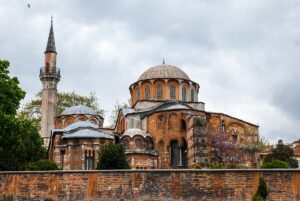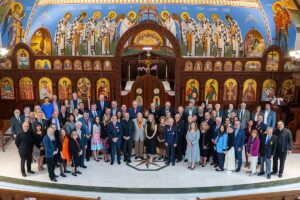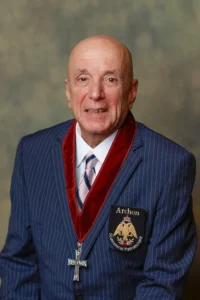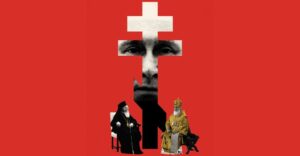|
|
| His All Holiness welcomes Patriarch Kirill of Moscow and All Russia to the Ecumenical Patriarchate. (N. Manginas) |
His All Holiness Ecumenical Patriarch Bartholomew welcomed His Beatitude Patriarch Kirill of Moscow and All Russia to the Phanar on July 4-6, 2009. This was the first official visit of Patriarch Kirill to the Mother Church of Constantinople as Patriarch. Shortly after his election as Primate of the Russian Church, he had announced his intention to follow the traditional ecclesiastical protocol for Heads of Churches, that is, to make a visit to the other Heads (Greek, Prokathemenoi) in the proper order, beginning with the Ecumenical Patriarch, the Archbishop of Constantinople and New Rome. His entourage included, among other clergymen, His Eminence Archbishop Hilarion of Volokolamsk.
After being received at the airport by the delegation of the Ecumenical Patriarchate, including His Eminence Metropolitan John of Pergamon, His Eminence Metropolitan Gennadios of Sassima, and V. Rev. Archimandrite Elpidoforos, Patriarch Kirill attended a Doxology at the Patriarchal Church of St. George, presided over by His Eminence Metropolitan Evangelos of Perge, Chairman of the Synodal Committee for Inter-Orthodox Affairs at the Ecumenical Patriarchate. That afternoon, the two Patriarchs also jointly chaired a special session of the same Synodal Committee.
During a formal reception in the Hall of the Throne, His All Holiness referred to the long acquaintance, friendship, and cooperation with Patriarch Kirill over many years and on many levels, congratulating the Russian prelate on his deserved election and assuring him of the support of the Ecumenical Patriarchate:
|
|
| Ecumenical Patriarch Bartholomew and Patriarch Kirill in the Throne Room. (mospat.ru) |
“Your Beatitude! You were born into a priestly family, you were nurtured by the piety of your priestly father, so that the Pauline words also hold true for you: “You have known the sacred letters from childhood, and these are able to enlighten you for salvation through faith in Christ Jesus.” (2 Tim. 3.15) When you were born, there was still “deep night”; and while you were a child, you experienced the horrible persecution that broke out exactly fifty years ago against the Church. You matured in difficult days, being molded as iron in the fire. All this was divine dispensation in order that you may be well prepared and qualified in ecclesiastical matters, gaining training and invaluable experience for the struggle that you have assumed upon your shoulders with the great burden of Patriarchal responsibility for the difficult and critical times that lie ahead. Your qualifications, together with your broad education, your spiritual cultivation, the open horizons of your thought, your manifold virtue, your numerous acquaintances throughout the world, as well as the confidence and love of your Hierarchy, clergy and laity, bode brightly for a fruitful Patriarchal tenure. We assure you that we are beside you. We extend to you a hand of sincere love and unfeigned cooperation. We are ready to work with you, in the context of canonical order and the ages-old and sacred ecclesiastical traditions, in directness of heart before God, for the benefit not only of our two Churches, but of the entire Orthodox and Christian world.”
|
|
| Ecumenical Patriarch Bartholomew and Patriarch Kirill concelebrate the Divine Liturgy in the Patriarchal Cathedral of St. George. (mospat.ru) |
The spiritual leaders of the Churches of Constantinople and Moscow concelebrated the Divine Liturgy in the Patriarchal Cathedral of St. George, manifesting the unity of the Church in the Mystery of the Divine Liturgy. The Ecumenical Patriarch stressed the historic role of coordinating between the various Orthodox branches, as well as the respectful relationship of the Russian Orthodox Church with the Ecumenical Patriarchate through the centuries — from the Christianization of the Slavs in the tenth century to the transmission of Orthodox monasticism and spirituality in the lives of the Saints. Addressing Patriarch Kirill, Ecumenical Patriarch Bartholomew spoke of times of certain difficulties in the past, “From time to time clouds have temporarily overshadowed ties between the sister churches. These … must immediately be sent to their places in the pages of history.”
Patriarch Kirill underlined the significance of his visit to Constantinople as “the glorious land of Orthodoxy … where the most formative events of Orthodoxy — and indeed of the world — took place,” adding that “we recall the events that led to the Baptism of Russia.”
As a way forward, the Ecumenical Patriarch proposed that all Orthodox Churches should look to Pan-Orthodox unity and cooperation, which will be manifested in the preparations for and process toward the Great Council. Moreover, the Ecumenical Patriarchal underlined the successful deliberations and exemplary collaboration at the recent Pre-Conciliar meeting in Geneva: “Still fresh in our memory as an example of this strong will among our Churches, for the sake of securing at any cost the unity of our holy Orthodox Church, is the wonderful unanimity realized during the recent 4th Pre-Conciliar Pan-Orthodox Conference, which took place at our Patriarchal Center on Chambesy-Geneva, where important decisions were taken to resolve the question of the Orthodox Diaspora, thereby removing one of the more serious hurdles in the journey of our Orthodox Church for the realization of the Holy and Great Council, which was decided with Pan-Orthodox consent.”
In response, Patriarch Kirill emphasized the pioneering role and contribution of Ecumenical Patriarch Bartholomew:
“Yesterday, we had the opportunity to discuss the importance of Pan-Orthodox unity. I would like to emphasize your personal role in coordinating this dialogue at a very difficult time. … It is very clear that our two Churches have the potential to permit us to preserve our inter-Orthodox relations for the benefit of all Orthodoxy. … Such relations are not a modern issue for the ecclesiastical hierarchy; they arise out of the very nature our hierarchy, of the church and of the Episcopal ministry.”
In addition, His All Holiness observed that the plight of our planet and the suffering of humanity should constitute the center of attention and common pastoral concern: “A spiritual crisis, a moral crisis, a financial crisis and indeed a crisis with many names characterizes our world from one end to another. It is true that militant atheism has retreated almost everywhere; yet the practical atheism of self-sufficiency, insensitivity and material pleasure are alive and strong. Supposedly in the name of God, the sounds of war are still heard, the blood of people is still shed, and numerous populations are uprooted and rendered refugees. Religious and nationalistic fanaticism is increasing, human beings are humiliated by evil “trafficking,” women and children are abused, drugs are pushed. At the same time, Christians — instead of remaining unified and working together in one spirit and one heart so that the hope that is within us may prove a convincing word — are troubled by divisions, disagreements and trivialities both on a pan-Christian level as well as (which is worse) on the inter-Orthodox level. Yet, this renders us greatly responsible before the Arch-Shepherd Christ, who demands us to have love, peace and unity among us in order that our light may shine before the world and that all people may be directed to the Father of Lights by means of our good deeds and example.”
Later, His All Holiness also remarked to reporters, “There has been progress within a good framework. We discussed all the issues openly and very sincerely. Our intention is to debate and resolve the remaining problems in the future with good will and with sincerity.”
During his homily at the Patriarchal concelebration of the Divine Liturgy, His All Holiness stated, “Your Beatitude and Holy Brother, everyone has their eyes focused upon us, expecting us to lead them by word, but especially by our example, in the way of reconciliation and love that is so imperative today. This is why it is crucial that we demonstrate an unswerving readiness above all to promote in every way our Pan-Orthodox unity. We already share the same faith, articulated and proclaimed by the Holy Synods. We have the same worship, as this was formulated in this City and then transplanted to the other Orthodox Churches. We have the same canonical order, unalterably defined by the order and regulations of the holy Ecumenical Councils. Our unity is based on these foundations. The structure of our Church into Patriarchates and Autocephalous Churches in no way implies that we constitute Churches and not a Church. Of course, the Orthodox Church does not have at its disposal a primacy of authority; however, it also does not lack a coordinating body, which does not impose but rather expresses the unanimity of our local Churches. This ministry is realized humbly — out of a long and sacred tradition — by this martyric Throne in absolute faithfulness to the prescriptions of Orthodox ecclesiology.”
Together with His All Holiness the Ecumenical Patriarch, Patriarch Kirill consecrated the church of the Russian Consulate General in Istanbul. Patriarch Kirill also met with Turkish Prime Minister Recep Tayyip Erdogan in Ankara, as well as with Ali Bardakoglu, Head of the Religious Affairs Department in Turkey. In his meeting with Bardakoglu, Patriarch Kirill made reference to the reopening of the Theological School of Halki, stating — according to the Turkish Daily News — that plans for its reopening are a positive step and an important contribution to inter-religious dialogue and the promotion of religious freedom, especially since there are some 20 million Moslems in Russia.
Patriarch Kirill stated: “The unity of the Ecumenical Church is revealed in the communion of the local Churches. All of them are linked in the bond of love. Yet, at the same time, we must not ignore the fact that the Church of Russia is especially connected with the First — in the canonical order of the sacred Diptychs — Patriarchal Throne of Constantinople. It is from here that we received the illumination of the light of faith and the principles of theological wisdom, architecture and iconography, as well as liturgy and all the diversity of the church’s structure.”
 |
View photos of Patriarch Kirill visit to the Phanar |










